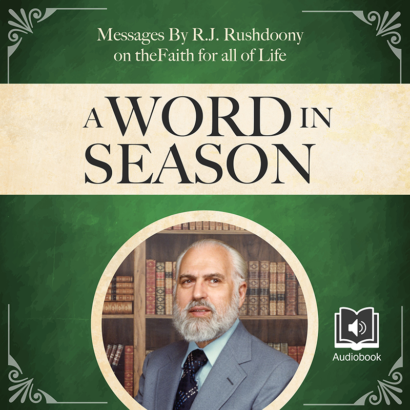
A is for Apprenticeship
• Mar, 03 2025
In this episode of Preschool Pioneers, host Jeremy Walker explores the importance of apprenticeship in education, emphasizing the need for children to gain practical, real-world skills alongside academic learning. He challenges the traditional push for college education, highlighting the financial burdens of student debt and advocating for vocational training as a path to economic independence. Walker discusses the role of Christian values in shaping a child's success, the benefits of family-run businesses, and the significance of integrating work experience from a young age. Tune in to discover why "learning while earning" is a crucial foundation for a thriving future.
Hosted by
Husband, Father, Pastor, Teacher, Podcaster, and Christian Education Advocate
- Series: Preschool Pioneers
- Topics:
Jeremy Walker (00:15):
And welcome back to Preschool Pioneers. I'm your host, Jeremy Walker. You can find us on our website to subscribe at cr101radio.com/preschoolpioneers. And you can subscribe to us on all the major podcast platforms so you never miss an episode.
(00:34):
Well, today we are entitling this episode A is for Apprenticeship, why it is important not only to give children an academic education, but while they also need to learn practical skills for the real world, or as I like to call them, learning while earning.
(00:55):
Well today guys, I want to talk about this idea of apprenticeship and why it is so different, at least different from what most people think whenever we're talking about education and children and what you're supposed to do to help your child kind of get that leg up. People have a lot of different ideas about the educational goals that their children need to have.
(01:18):
I was recently watching a TV series. And the TV series had high schoolers who were about to graduate and were talking about how your scores were not good enough. The child did not have a good enough academic career to enter into what they've considered to be college the next leg of life. And instead, they were trying to give them vocational ideas. If you can go to be a welder or any other practical field of work and this was seemed to be a bad thing, kind of a disparaging thing. Somehow this was the failed life to start out with. And if you don't go into academic higher studies in college, then somehow your life was just not going to turn out the way it should be, or it had gotten off the rails somehow.
(02:05):
I venture to say quite the opposite is true. Now, it's been kind of different from when I was growing up because college was a very big thing, pushing, pushing, pushing. However, now you're having a lot of people say, "Don't go to college." That's right. "Don't go to higher learning academic subjects" in particular nowadays when most of the higher education in college has nothing to do with setting you up for the real world. The only thing it's going to teach you about for the most part is debt. And of course they're not going to teach you about debt before you get into it, but only afterwards. And then you have all these young folks who get out of high school, go into college, complete college after four to eight years and have a massive amount of debt. Then they're thinking about starting a family, getting their own house, everything that comes with it after this academic, educational career. And nothing can be more harmful to children than that.
(03:03):
Instead of ladling our children with debt, how about we set them up for an economic future that flourishes rather than enslaving them as a debtor for 10, 20, 30, or even 40 years by going through these silly idea that you need college to succeed far, far from it. What you need to do is be able to live in the real world successfully.
(03:33):
So let's break these things down. What exactly does a person need to succeed? Well, they need to be able to eat. So you got food, you have shelter. You got that. You got the basic necessities. And then you've got clothing, you need that as well. Pretty much most other things are luxuries at that point. Now, if you have a family, you're going to have to have more money to take care of the children. You have a wife, you have to take care of them. And so all the real world necessities kind of catch up to you after a while.
(04:02):
And what happens is you find that it's not necessarily intellectual concept, but the concept itself is more of a practical one. "How can I put food on the table? How can I put clothes on my children's backs? How can I take care of all the needs, medical and otherwise, for my family?" And that's not the question that they start teaching children when they're young.
(04:27):
We were recently talking as well, my wife and I, about the concept also of marriage. And when is it you start teaching your children about the importance of marriage, the structure of marriage, how it's supposed to be set up, how to prepare yourself for it, well, you don't start teaching that at 18. That's way too late. And I mentioned kind of off the cuff to my wife, I said, "Well, the time you start teaching children about marriage and being prepared for it is as soon as they're born." And that seemed to be a very profound thing because they just kind of popped out when I said it. But that's true of every subject, not just the concept of marriage and being prepared for that, but everything about life that no one talks about, about how to make your money, save your money, spend your money wisely, and how to get it the jobs that you might have.
(05:15):
This idea of intellectual respectability is just that, silly. Very, very silly. And people are going about the idea of child-rearing, thinking of the concept of education as if it is some kind of an intellectual concept and that's where it stops. Well, you can make your children what I call smart, but it does not make them wise. And that's the difference between what I call the new Greek idea, everything's up in the mind. You have a duality between the spirit of man, the mind of man, and of course the physical needs of man instead of being, "No, those are all there. You have to have everything."
(05:59):
And so there are subjects that are just strictly, for the most part, intellectual in some way. And then you have more physical ones, like how to lay bricks as an example, or how to be a mechanic. They have very much intellectual concepts, experience concepts, but then all the knowledge doesn't get you out of bed in the morning. It doesn't. All that knowledge doesn't teach you how to obey authority. It doesn't teach you how to be good in public relations. It doesn't teach you how not to be a thief. And so everything about education has to have a moral foundation to it, a religious moral foundation to it. And if it's not Christianity, you are going to set your children up for failure.
(06:44):
The people that are kind of the highest of the high, especially right now, people talk a lot about Elon Musk, Donald Trump, you got Jeff Bezos from Amazon, and these guys aren't, for the most part, at least most of them, don't even claim to be Christians. I think Trump does, but the other ones do not. And the point I'm trying to make is not about these people personally. But to live in the real world, the world operates a certain way. Economics operates a certain way when people talk about socialism and communism or capitalism and things like that. These are all moral subjects, not just economic ones.
(07:20):
And children, whenever they're being taught from birth, are being given a religious education. Me, if you haven't known who I am, and since this is season 3, episode one A is for apprenticeship, let me give you a little bit of background to who I am and why I think this is so important and the first-hands experiences that I'm currently working with with my children.
(07:44):
Well, I'm a Christian minister, have been for a very long time. I worked primarily in the field of early Christian education. So from infants up through about age 12 is the primary focus. The concept of Preschool Pioneers, which is where this title came from, came because we had a theologian named R.J. Rushdoony. If you're not familiar with that, you can go to rushdoonyradio.org to find out more about him. A great teacher and mentor, great educator. And he called a ministry that I'm involved in here in Southwest Florida that my father-in-law started about 36 plus years ago, he called us Preschool Pioneers because this field of education is Christianity. The entire encompassed concept of the great commission that we have been given as Christians, it pertains to our families, but also pertains to the wider world. And that is an educational goal. That's what it is. The great commission is educational.
(08:46):
Now, we don't make converts. We spread, we teach, we disciple. But we can't change people. That is definitely only in the hands of the Holy Spirit. God has to do that. He's the only one who can change hearts and minds. Now, our job is to disciple them, and that means there are certain things on the outside. As a parent, they put restrictions on children. They teach them how they're supposed to live, and the reward. Or of course have punishments, the positive, the negative, the carrot and the stick to kind of guide them and goad them in that direction. And that's why you can have a society full of people that can be very cordial, but doesn't mean that all the people are good. It just means that they understand what the rules are and they prefer not to be in trouble. And when they're good, there's a lot of benefits there, a lot of positivity, a lot of rewards if you will.
(09:41):
And so we can teach, we can educate, we can bind up and try to help grow. Kind of like a bonsai tree. And as it's growing, they come in there with their metal pieces and try to teach it how they want it to grow. That right there is probably the biggest difference. So if you're thinking about... If you've never really thought about the idea before, but why is everything educational religious? That's it. Because there's a goal. You're starting with the child as they are born. And then there's an end goal. Where do you want them to be? And everything along the line, every way that you're going to guide them is then going to be kind of shooting for the bullseye. But you have to help them get there; teaching, training, discipling. And that includes not just the intellectual concept.
(10:29):
A big focus of the homeschool movement used to be the fact that our homeschoolers are academically better than the government or public school children. Well, that's all true, but what happened was a big part of the homeschool movement flopped. Not because they didn't have the right motivations, but because they focus on academics and there was no practical, practical education given. So basically they get to the end of their, what we call high school career, 18 years old, whatever, and they're not ready for the real world. They are socially awkward, most of them. Most of them stayed at home. Mom, dad didn't go out much. Maybe did some co-ops and things like that, but socially awkward for the most part.
(11:15):
Instead, what they could be doing is apprenticing their children in the real world. And yeah, that does include of course academics. So reading and writing, arithmetic, all those are foundational for success of course. However, without the practical side of things, teaching you to get up and get out of bed, teaching you to do a job from start to finish, to be honest, to be trustworthy, to be the person who doesn't do just enough but goes beyond that. Take the Bible to book of Proverbs and everything else that's there, every admonition that is right there. And that is your goal. That is your playbook. And especially the Book of Proverbs is full of this type of wisdom and how to guide your children to get them to succeed by the time that they're ready.
(12:00):
The goal for parents and Christian teachers is not to have your children be dependent on you, the government or anyone else. Our goal is to have them dependent on one thing and one thing only, that is God is their foundation. But otherwise they're fully equipped to be independent individuals living successfully in God's world.
(12:26):
Now I mentioned earlier when we first got started, the concept of learning while earning because that is the traditional concept of an apprenticeship. And I went through some definitions and looked it up because I wanted to be able to have something that I could kind of connect with people based on the definition. And one of the things for an apprenticeship was it was working for an employer who teaches this person or your children or yourself a trade and/or a profession. Now, when people go to traditional college, that's not what they're doing. They're teaching subjects. And most of the things that children are enrolling in have no real world value at all. Just look up anywhere about ridiculous college courses and there you're going to go.
(13:15):
But for the most part, it's not geared towards an end goal. It's just like for your personal betterment. Well, your personal betterment would mean that you could be more productive, means you could do something better, you could earn more money. But instead it just puts facts or information or pseudo facts in your head but doesn't actually benefit you at all. Kind of like in high school. When I was in high school, we had to learn science and whatnot, the periodic table, and many, many other things, calculus and all kinds of other things. Now these things have their place, proper knowledge, good knowledge, but for what purpose? Most people are not going to be in any field that requires them to work with a periodic table at all, ever.
(13:57):
Most people are not to be in a field where they need to know advanced mathematics like algebra, trigonometry, calculus and these things. There are certain fields where those are required, but not by most people. But this isn't how we decide to educate our children about what they are going to need to get to the next step and to succeed. That's what we should be doing.
(14:23):
Now, there's a lot to be said about as children are growing about letting them find out where their strengths are at. You don't want to take a square and force it into a rectangular or triangular piece. So that you can't do. But for the most part, most of the practical skills will be going across the board to most people, including the big one, which is public relations. And most people never teach that to children, the concept of public relations. And that is probably one of the most universally used and universally promoted ideas to push you up that ladder in the real world is public relations and sales and things like that.
(15:03):
Also in their concept for apprenticeship was receiving a skill-based education that lasts between one to four years. Skill-based, not topic-based. Skill-based. I'm learning something because I'm trying to learn to do something like bricklaying or construction or what have it that you're trying to do, be an accountant, whatever that field is going to be. Because we never talked to children about that concept, vocation.
(15:34):
I remember when I was growing up, people used to ask you what you wanted to be when you grew up. And it got to the dumb concept like, "I want to be an astronaut or I want to be this or that." And they were like, "I want to be Superman." But they weren't actual vocations that they could make a living at.
(15:47):
Now I remember when it used to be a thing of pride where it was like Harrison and Sons or whatever, and people would kind of go into the field, the practical field, the work field that their family did. My dad was a mechanic, his dad was a mechanic. My two uncles and my other side are mechanics. And then you got the guys who are like, "Well, I'm career military. Everybody in my family worked for the police. We are bricklayers, we are engineers, whatever it was." But people would pass on their skills on to their children and pass on what they knew, that knowledge.
(16:24):
And then of course there are people who didn't necessarily have skills, but they wanted their children to gain skills. And what they would do is they find somebody and they would say, "You know how to do whatever." Let's say it is once again bricklaying. And you found a guy who's a really good successful bricklayer, he knows what he's doing. And then you would send your children to go work for this man, become his apprentice, let him teach you everything that he knows and you're going to get paid. You're going to learn while you earn. And this right here should be the goal. Parents should be helping their children figure out something that can help them with their future success, which is practical, not just an intellectual concept that does not translate into a paycheck, that does not translate in putting food on the table, does not translate into buying your own home and your car and staying out of debt.
(17:22):
Another one was earning money while learning skills and gaining experience. Now, when people go to college, they're learning facts about subjects that are not going to help them in the future, right? They are not gaining any experience because they're not doing the thing that they're doing. And they're not learning any skills because they don't have it in goal in mind. College, for the sake of college education, is usually about the youth sowing their wild oats, getting away from home, being on their own for the first time, surrounded by lots of other people that are all the same age, and you have your wild heyday for four to eight years.
(18:02):
Now, that is not reality. We do not live in a world where we are with our peers, those people. We are in a plethora of people on every level with ages ranging from two years old to 92 years old. It doesn't matter if you are working for Publix, if you're working for Walmart or where you're at. There's not a place where you go and it's spring break all the time and it's party time. In the real world, people have to work, people have to produce, and people are going to have to work politely with other people.
(18:34):
Nothing will destroy faster a society, a city, and anything when you have uncontrolled people. All you have to do is turn on the news. And recently you started seeing certain cities around America who had uncontrolled populations of people who were violent, who were burning things down. And the businesses started leaving and people were like, "Oh, you want to hurt us? You just hate the people that live here." It's like, "No, I can't serve people who were going to steal from me." California is big on this. These shops have to lock everything up because the people around are thieves. And so all the businesses have to move out. They cannot succeed in a place where people are going to steal, intimidate, and destroy their property. Of course they're going to leave. And society will fall completely apart.
(19:23):
These people, lots of people around the entire United States and the world are not being taught how to succeed. And the nefarious aspect is they don't want you to succeed. They don't want you to succeed. Because if you are not a person who is self-controlled, who is independent, who can make money for yourself, control yourself, then you don't need a big government. You don't need big brother holding your hand. You can be a independent person making your own family, producing children, and producing a stable society.
(19:59):
Now, that's what we should be doing, is producing Christian stable societies. And that's what God's law does, but that's not what humanism does. And so what we're talking about here, two different subjects. The goals of which, one is humanism, which is trying to get away from God's law. And when it does that, it destroys the person, it destroys the family, it destroys the businesses, it destroys the community, it destroys everything in its wanton hatred for God.
(20:28):
And on the other side, you have Christians who are building that person up, the individual person who has ability, character. They can then also take care of others like getting a husband or a wife. They can then have children take care of them. They can actually produce and be of benefit to other people and not just themselves. This is a difference of outlook of where you want to be.
(20:54):
Now for me, I have 11 children. I am a minister. I'm one of the senior pastors of my church. I have been working in Christian education as I mentioned earlier for over about 25 years now, somewhere around there. And I helped supervise seven of our preschools that we have here in southwest Florida, serving over 1,500 students collectively all together. And on top of that, I have 11 children, my wife and I. And over the years they have grown up in our schools with us. They get the reading, writing, arithmetic, education there. But also apprenticeship, practical skills and how to help the family run a preschool.
(21:36):
Now, it's not just about education and preschools and Christian education. I recently met a person who was paving our driveway, and I saw some young kids that were out there about between 11 to 15 years old. So I walked out to talk to them, and they were the ones helping put all the asphalt down and making sure it was all done. I said, "Hey, you guys homeschooled?"
(21:54):
"Oh yeah, we do our book stuff, but we also get real world experience." Like, excellent. That's what you need more than anything else. And I was so proud to see that there were families doing. Now, these weren't necessarily Christian families per se, but these were people who understood. And they could have been Christians, I didn't ask at the time. But they understood that need for a practical education. That's what they needed. And they kept them out of the government schools that would destroy their morality.
(22:18):
I met another family who came in to see us, and they worked nearby, husband and wife, chiropractor company, and the children worked with them. They were very young at this phase. They're not actually working at the chiropractor's office yet, but they're homeschooling their kids, keeping them out of the government schools. They even talked about the importance of doing that, watching your kid's character and raising them up so that they of course can eventually learn how they're supposed to succeed on their own.
(22:50):
But as our third season here, Preschool Pioneers continues, I will be sharing a lot more about the apprenticeship that I have put my own children through, similar to what I'm discussing as well about the other couple of families here that I mentioned, and various other businesses. Because the family-run business used to be a thing, as I mentioned earlier, because they used to teach these skills to their children. And you just don't have that anymore. It's something that has been lost. And it's because of course, they also see a disconnect between the family, business and children.
(23:25):
And on top of that, which we're going to be touching on this topic quite a bit as well, there's also a disconnect in business between a husband and a wife, as if the idea is that a husband goes off to work and make the money and the woman sits at home by herself or with the children to take care of that, but she has no, no help in the world of the economy where money is being made.
(23:49):
So I'm going to be sharing a lot about this in the next coming episodes because it's a very important topic that not only is it for Christian education, but for every single Christian family to make you close-knit and of course connected with each other. So I'm going to be touching on this quite a bit. We did talk about it a little bit today for apprenticeship because I do want to set the tone for what we're going to be discussing on this third season of Preschool Pioneers. It's a very important subject, teaching your children to succeed and giving them the tools to do that.
(24:27):
Well, I want to thank you again for helping me kick off season 3 of Preschool Pioneers. This is Jeremy Walker thanking you for coming by and hopefully helping you understand how important your role is with your children and their futures. Thank you again for joining me. God bless.
More podcasts in series

B is for Behavior
Jun 10, 2025

Z is for Zombieland
Dec 19, 2024

Y is for Your Body, You Choice
Nov 10, 2024

X is for Xenophile and Xenophobe
Oct 21, 2024

W is for Whiteness
Sep 23, 2024

V is for Values
Sep 16, 2024

U is for Uncommon
Sep 07, 2024

T is for Transformers
Aug 26, 2024

S is for S.T.D.
Jul 24, 2024

R is for Raising Rebels
Jul 23, 2024

Q is for Quitting
Jul 22, 2024

P is for Pyramids
Jun 26, 2024

O is for Opportunity
Jun 19, 2024

N is for Nationalism
Jun 13, 2024

M is for Mind Magnets
May 19, 2024

L is for Lowering Standards
May 12, 2024

K is for Kool-Aid
Apr 28, 2024

J is for Justified
Apr 15, 2024

I is for Integration
Apr 08, 2024

H is for Homeschooling
Apr 01, 2024

G is for Godly Fathers
Mar 25, 2024

F is for Flat Earth
Mar 18, 2024

E is for Economics and Entrepreneurship
Mar 12, 2024

D is for the Department of Children and Families
Mar 12, 2024

C is for Childbearing
Mar 12, 2024

B is for Bears, Beets, and Battlestar Galactica
Mar 12, 2024

A is for Abandonment
Mar 12, 2024









